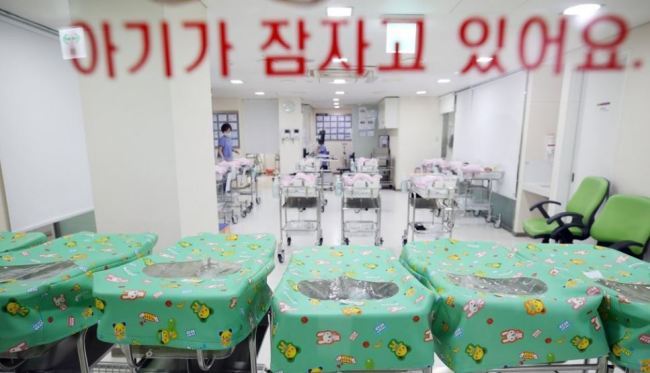Seoul on Thursday introduced a set of measures to boost the country’s chronically low birthrate, including more support programs for single parents and infertility treatment coverage for common-law couples.
The measures reflect the Moon Jae-in government’s espousal of diverse forms of families, in a country where single parenthood and common-law marriages are still often stigmatized.
The 900 billion won ($804 million) measures, which go into effect next year, were announced with statistics that showed the country’s fertility rate was likely to hit a record low this year -- less than 1.0 birth per woman.
 |
(Yonhap) |
Korea already saw its lowest-ever birthrate last year at 1.05 births per woman, falling below the previous record low set in 2005. The country needs a birthrate of 2.1 births per mother, to keep its population level stable at 51 million, according to the government.
“We believe it is important to improve the quality of life of Koreans who are in their 20s and 30s, who are either already parents or those who hope to expand their families,” said Rep. Kim Sang-hee, vice chairwoman of the Presidential Committee on Aging Society and Population Policy.
“We tried to create measures that could be applied to all Koreans, regardless of their economic status. We also believe it is important to embrace all kinds of families and support them.”
Among the newly introduced measures is the increased state allowance for single parents. Until this year, the monthly allowance was cut off once the child turned 15.
The government is increasing the monthly allowance to 170,000 from the current 130,000 won, and it will be given to all single parents with children aged 18 or younger. Single parents younger than 24 are eligible to receive 250,000 won monthly.
With the implementation of the measures next year, all unwed, single mothers will also be able to register their children with their surnames, should they wish to do so. Currently, even if an unwed mother registers her child under her surname, it would automatically change to the biological father’s last name once he legally acknowledges him or her as his child.
Also, common-law couples who wish to have children without getting married will become eligible to get their infertility treatments covered by the national health insurance program, starting next year.
Korea is a country where out-of-wedlock birthrate is extremely low, compared to other advanced economies, meaning unmarried people usually don't end up being parents here.
In 2010, Korea’s out-of-wedlock birth rate was 2.1 percent, significantly lower than that of other countries, such as Norway (55 percent) and Ireland (64.1 percent).
The former Park Geun-hye administration tackled the issue rather differently. Rather than providing support for all parents, including single mothers and unwed couples, the Park administration, as a way to boost the fertility rate, actively encouraged young people to get married by promoting ways to have “small and affordable” weddings and offering housing benefits for newlyweds.
“We aim to support all kinds of families,” said an official from the Ministry of Gender Equality and Family. “The point is to support all mothers -- and fathers -- regardless of their marital status and background, and according to their specific needs.”
Among other newly introduced measures is the 10-day paternity leave for fathers of newborns. Currently, three days of paternity leave are mandated.
Medical costs for expectant mothers and babies aged zero to 1 will become significantly cheaper starting next year. Parents with children aged 8 or younger will be able to work an hour less a day for up to two years without any wage cuts.
Earlier this month, Seoul implemented a new 52-hour workweek in an attempt to tackle the country’s chronic workaholic culture and eventually boost the fertility rate -- by encouraging Koreans to spend more time with their families.
Last year, 357,700 babies were born in Korea, a number which is significantly lower than the previous year’s 406,200. In the 1970s, about 1 million babies were born annually. The government has warned that if not dealt with properly, only about 200,000 babies will be added to the population yearly before the year 2022.
By Claire Lee (
dyc@heraldcorp.com)








![[Today’s K-pop] Blackpink’s Jennie, Lisa invited to Coachella as solo acts](http://res.heraldm.com/phpwas/restmb_idxmake.php?idx=644&simg=/content/image/2024/11/21/20241121050099_0.jpg)